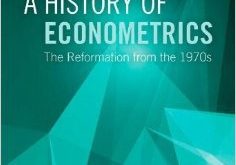How evidence is treated in modern macroeconomics ‘New Keynesian’ macroeconomist Simon Wren-Lewis has a post on his blog discussing how evidence is treated in modern macroeconomics (emphasis added): It is hard to get academic macroeconomists trained since the 1980s to address this question, because they have been taught that these models and techniques are fatally flawed because of the Lucas critique and identification problems. But DSGE models as a guide...
Read More »Giving is loving (personal)
Giving is loving (personal) [embedded content]
Read More »C H Hermansson (1917-2016)
C H Hermansson (1917-2016) [embedded content] Ytterligare en av det svenska 1900-talets politiska giganter har gått ur tiden.
Read More »How true is Friedman’s permanent income hypothesis?
How true is Friedman’s permanent income hypothesis? Noah Smith has an article up on Bloomberg View on Milton Friedman’s permanent income hypothesis (PIH). Noah argues that almost all modern macroeconomic theories are based on PIH, especially used in formulating the consumption Euler equations that make up a vital part of ‘modern’ New Classical and New Keynesian macro models. So, what’s the problem? Well, only that PIH according to Smith is ‘most certainly...
Read More »Gary Becker’s big mistake
Gary Becker’s big mistake The econometrician Henri Theil once said “models are to be used but not to be believed.” I use the rational actor model for thinking about marginal changes but Gary Becker really believed the model. Once, at a dinner with Becker, I remarked that extreme punishment could lead to so much poverty and hatred that it could create blowback. Becker was having none of it. For every example that I raised of blowback, he responded with a...
Read More »Greetings from Hamburg (personal)
Greetings from Hamburg (personal) On our way down to Heidelberg we spent a couple of days in Hamburg, visting Speicherstadt, the largest warehouse district in the world on timber-pile foundations, and since 2015 part of UNESCO World Heritage. Awesome.
Read More »Econometric forecasting — an assessment
Econometric forecasting — an assessment There have been over four decades of econometric research on business cycles … The formalization has undeniably improved the scientific strength of business cycle measures … But the significance of the formalization becomes more difficult to identify when it is assessed from the applied perspective, especially when the success rate in ex-ante forecasts of recessions is used as a key criterion. The fact that the onset...
Read More »Austerity policies — nothing but kindergarten economics
Austerity policies — nothing but kindergarten economics [embedded content] I definitely recommend everyone to watch this well-argued interview with Steve Keen. To many conservative and neoliberal politicians and economists there seems to be a spectre haunting the United States and Europe today — Keynesian ideas on governments pursuing policies raising effective demand and supporting employment. And some of the favourite arguments used among these...
Read More »Good reasons to worry about inequalities
Good reasons to worry about inequalities Focussing upon inequality statistics … misses an important point. What matters is not just the level of income inequality, but how that inequality arose. A free market society in which high incomes arise from the free choices of consenting adults – as in Robert Nozick’s Wilt Chamberlain parable – might have the same Gini coefficient as a crony capitalist society. But they are two different things. A good reason to be...
Read More »Lucas-Rapping and ‘New Keynesian’ models of unemployment
Lucas-Rapping and ‘New Keynesian’ models of unemployment Lucas and Rapping (1969) claim that cyclical increases in unemployment occur when workers quit their jobs because wages or salaries fall below expectations … According to this explanation, when wages are unusually low, people become unemployed in order to enjoy free time, substituting leisure for income at a time when they lose the least income … According to the theory, quits into unemployment...
Read More » Lars P. Syll
Lars P. Syll








